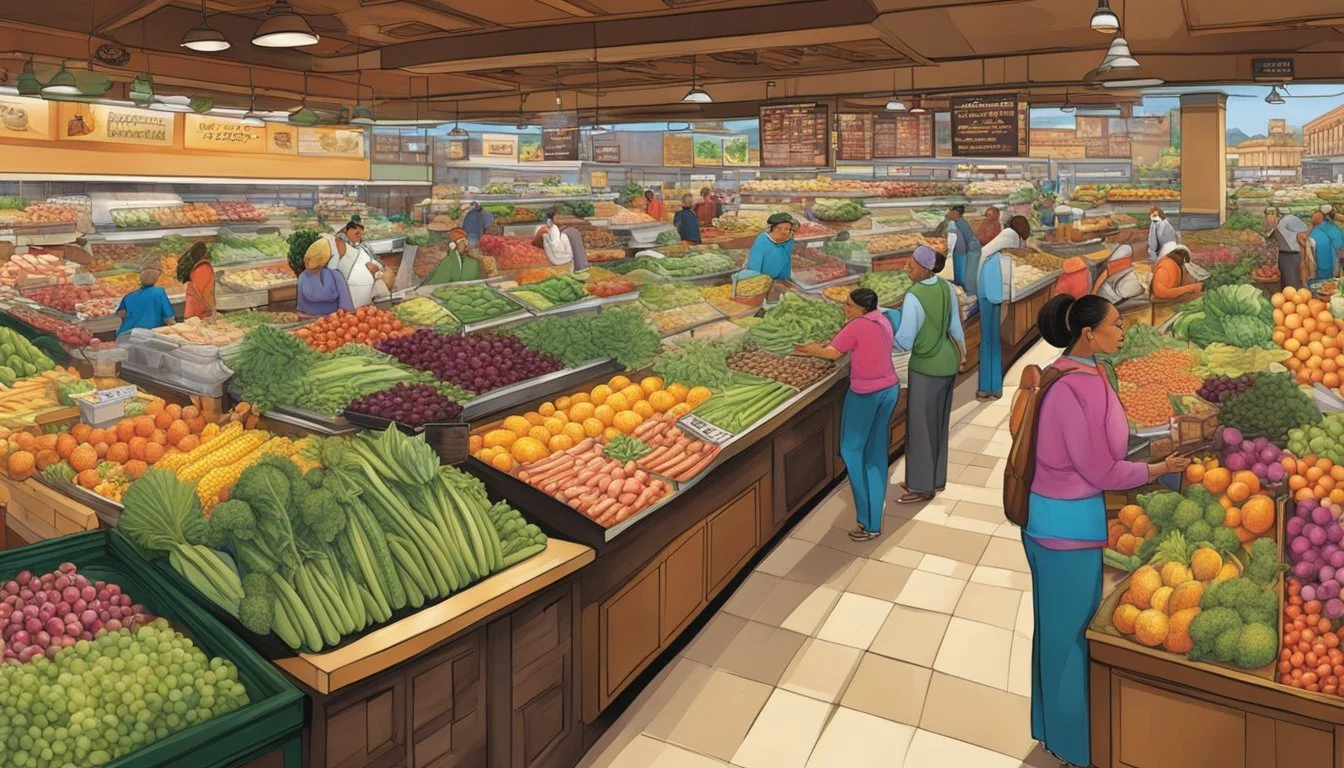Cardenas Markets vs Wegmans
A Comprehensive Comparison of Quality and Value
Cardenas Markets and Wegmans represent two distinct grocery store experiences catering to different customer bases. Cardenas Markets specializes in Hispanic and Latin American foods, offering a wide array of authentic products and fresh produce. Wegmans, on the other hand, is known for its upscale shopping atmosphere, extensive selection of gourmet items, and commitment to customer service.
When comparing these two supermarket chains, Wegmans generally comes out ahead in terms of overall quality, variety, and customer satisfaction, but at a higher price point. Cardenas Markets excels in providing culturally specific products and competitive prices on certain items, making it a preferred choice for shoppers seeking authentic Latin American ingredients.
The decision between Cardenas Markets and Wegmans ultimately depends on individual preferences, budget constraints, and specific shopping needs. Cardenas Markets offers a unique cultural experience and specialized products, while Wegmans provides a broader range of premium options and a more extensive selection of mainstream grocery items.
Company Backgrounds
Cardenas Markets and Wegmans represent two distinct stories in the American grocery landscape. Both have grown from regional roots to become significant players, though their paths and scales differ considerably.
Origin and Growth of Cardenas Markets
Cardenas Markets began as a small family-owned business in 1981. Founded by Jesús Cárdenas Sr. and his wife Luz in Ontario, California, the company started with a single store catering to the Hispanic community. Over the years, Cardenas Markets expanded its presence across the Southwestern United States.
The chain now operates over 50 stores in California, Nevada, and Arizona. Cardenas Markets is known for its fresh produce, authentic Hispanic foods, and in-store prepared meals. The company has maintained its family-owned status while growing into a regional powerhouse in the grocery industry.
Wegmans: From Regional to National
Wegmans Food Markets traces its history back to 1916 when brothers Walter and John Wegman opened their first store in Rochester, New York. What started as a small produce pushcart has evolved into a beloved grocery chain with a national reputation.
Wegmans has expanded steadily, now operating over 100 stores across seven states, primarily in the Northeast and Mid-Atlantic regions. The company remains family-owned, with successive generations of the Wegman family at the helm. Wegmans is renowned for its extensive product selection, high-quality fresh foods, and exceptional customer service.
The chain has consistently ranked as one of the best places to work in America, according to Fortune magazine. Wegmans' growth strategy has been deliberate and measured, focusing on maintaining quality and culture as it expands into new markets.
Store Experience and Design
Cardenas Markets and Wegmans offer distinct shopping environments tailored to their target customers. Both chains prioritize convenience and layout to enhance the grocery shopping experience.
Ambiance and Layout
Cardenas Markets embraces a vibrant, colorful atmosphere reminiscent of Latin American markets. Bright signage and festive decor create a lively ambiance. The produce section often takes center stage, showcasing fresh fruits and vegetables.
Wegmans opts for a more upscale, sophisticated design. Subdued lighting and earthy tones create a calm shopping environment. The store layout typically features a grand entrance leading to a sprawling produce department.
Both stores organize products logically, but Wegmans tends to have wider aisles and more open spaces. Cardenas Markets may feel more compact, especially in urban locations.
Convenience Features
Cardenas Markets focuses on efficiency for quick trips. Self-checkout lanes are common, and the deli often offers pre-packaged options for grab-and-go convenience.
Wegmans emphasizes a comprehensive shopping experience. Many locations feature in-store dining areas, coffee shops, and extensive prepared food sections. Digital price tags and mobile app integration streamline the shopping process.
Both chains offer online ordering and curbside pickup. Wegmans typically provides more tech-driven solutions, such as scan-and-go options for faster checkout.
Product Range and Quality
Cardenas Markets and Wegmans differ significantly in their product offerings and quality standards. Both stores prioritize freshness and variety, but their approaches and target markets vary.
Freshness and Quality of Produce
Wegmans is renowned for its extensive produce section, featuring a wide array of fresh fruits and vegetables. The store emphasizes locally sourced items when possible, enhancing freshness and supporting regional farmers. Wegmans' produce is consistently high-quality, with staff regularly checking and rotating stock.
Cardenas Markets, specializing in Hispanic groceries, offers a unique selection of tropical fruits and Latin American vegetables. Their produce section, while smaller than Wegmans', provides hard-to-find items for authentic Latin cuisine. Freshness can vary, but prices are generally competitive.
Organic and Natural Selection
Wegmans has made significant strides in expanding its organic and natural food offerings. The store dedicates ample shelf space to organic produce, meats, dairy, and packaged goods. Wegmans' organic selection rivals that of specialty stores like Whole Foods, often at more competitive prices.
Cardenas Markets has a more limited organic selection. While they do offer some organic products, the focus is primarily on conventional items. Natural and health food options are available but not as extensive as Wegmans'.
Private Label and Exclusive Brands
Wegmans' private label products are a cornerstone of its brand. The Wegmans brand covers a vast range of items, from basic staples to gourmet products. These in-house brands are known for their quality and value, often matching or exceeding national brands in taste tests.
Cardenas Markets also offers private label products, primarily focused on Hispanic food items. Their in-house brands provide authentic flavors at affordable prices. While the selection is not as extensive as Wegmans', Cardenas' private label products cater specifically to their target market's preferences.
Food Services and Prepared Options
Cardenas Markets and Wegmans offer diverse prepared food options to cater to customers seeking convenient meal solutions. Both stores provide deli services, hot food bars, and bakery items, though with distinct approaches and specialties.
Deli and Hot Prepared Foods
Cardenas Markets emphasizes traditional Hispanic cuisine in its deli and hot food offerings. Their hot bar features items like carnitas, chile rellenos, and tamales. The deli section offers freshly made tortas and burritos. Cardenas also provides a salsa bar with various housemade salsas and condiments.
Wegmans, on the other hand, presents a more extensive and eclectic selection. Their hot bar rotates dishes from different cuisines, including Italian, Asian, and American comfort foods. Wegmans' deli counters offer made-to-order sandwiches, sushi, and a variety of salads and sides.
Both stores sell rotisserie chickens, but Wegmans adds options like chicken wings in various flavors. Wegmans also features a dedicated sub shop within many stores.
Bakery and In-store Dining
Cardenas Markets' bakery department, known as "La Panadería," specializes in Mexican sweet breads and pastries. They offer fresh-baked bolillos, conchas, and seasonal items like pan de muerto. The bakery also produces cakes for special occasions.
Wegmans boasts a larger bakery operation with artisan breads, European-style pastries, and custom cakes. They also have a patisserie section in many stores, featuring gourmet desserts and chocolates.
For in-store dining, Cardenas typically provides a seating area near the hot foods section. Wegmans offers a more elaborate setup with their Market Café, which includes various food stations and ample seating. Some Wegmans locations even feature full-service restaurants and pubs within the store.
Pricing and Value for Money
Cardenas Markets and Wegmans offer distinct pricing strategies and value propositions for shoppers. Both stores aim to provide competitive prices while emphasizing different aspects of the shopping experience.
Everyday Prices and Discounts
Cardenas Markets focuses on offering affordable prices on Latin American and Hispanic food products. Their everyday prices tend to be lower than mainstream supermarkets for these specialty items. Cardenas frequently runs sales and promotions on fresh produce, meats, and pantry staples.
Wegmans, while not the cheapest option, provides competitive pricing on their store brand products. They offer a mix of premium and budget-friendly options across departments. Wegmans' "Consistent Low Prices" program keeps certain staple items at reduced rates year-round.
Both stores feature weekly circular ads with discounts and deals. Cardenas often includes coupons in their circulars for additional savings.
Membership and Loyalty Programs
Cardenas Markets offers a free loyalty program called "Cardenas Club." Members earn points on purchases, which can be redeemed for discounts on future shopping trips. The program also provides exclusive deals and personalized offers.
Wegmans does not have a traditional loyalty program. However, they offer a digital coupon system through their mobile app. Shoppers can clip digital coupons for instant savings at checkout.
For online shopping, Wegmans partners with Instacart. Instacart Express members enjoy free delivery on Wegmans orders. This service is comparable to Amazon Prime's benefits for Whole Foods, though not directly tied to Wegmans.
Customer Experience and Service
Cardenas Markets and Wegmans both prioritize customer satisfaction, but their approaches differ. Each store has unique strengths in staff assistance and community engagement.
Staff and In-store Assistance
Wegmans is renowned for its exceptional customer service. The company invests heavily in employee training, resulting in knowledgeable and attentive staff. Wegmans employees are often praised for their helpfulness and product expertise.
Cardenas Markets, while less recognized nationally, focuses on creating a welcoming atmosphere for its largely Hispanic customer base. Staff members are typically bilingual, offering assistance in both English and Spanish.
Both stores provide in-store services like meal preparation advice and product recommendations. Wegmans offers a more extensive range of specialty departments, including cheese shops and bakeries with dedicated experts.
Community Involvement
Wegmans has a strong reputation for community engagement. The company supports local food banks, education initiatives, and youth programs. Their commitment to social responsibility has earned them recognition from The Harris Poll as one of America's most reputable companies.
Cardenas Markets focuses its community efforts on Hispanic neighborhoods. They sponsor cultural events, provide scholarships, and support local businesses. This targeted approach helps strengthen their connection with their core customer base.
Both stores organize in-store events and cooking demonstrations. Wegmans hosts health and wellness seminars, while Cardenas Markets often features Latin American cuisine workshops.
Customer feedback on platforms like TrustPilot generally reflects positively on both stores' community initiatives. However, Wegmans tends to receive more consistently high ratings for overall customer satisfaction.
Sustainability and Ethical Practices
Cardenas Markets and Wegmans both emphasize sustainability and ethical practices, though their approaches differ. Each retailer has implemented various initiatives to reduce their environmental impact and improve animal welfare standards.
Environmental Initiatives
Wegmans has made significant strides in sustainability. The company focuses on reducing food waste through donation programs and composting. They've also implemented energy-efficient lighting and refrigeration systems in their stores. Wegmans aims to divert 80% of store waste from landfills.
Cardenas Markets has taken steps to reduce plastic usage. They've introduced reusable bags and encourage customers to bring their own containers for bulk items. The company has also installed solar panels on some store roofs to decrease reliance on non-renewable energy sources.
Both retailers offer a selection of organic food products, catering to environmentally conscious consumers. Wegmans has a larger organic section, while Cardenas Markets focuses on locally sourced organic produce.
Animal Welfare Standards
Wegmans has established comprehensive animal welfare standards. They work with suppliers who follow humane practices for livestock. The company has committed to sourcing 100% cage-free eggs by 2025. Wegmans also offers a wide range of plant-based alternatives, including dairy-free cheese options.
Cardenas Markets has made efforts to improve their animal welfare practices. They've increased their selection of free-range chicken and grass-fed beef products. The company has partnered with local farmers who adhere to higher animal welfare standards.
Both retailers provide clear labeling on animal products, allowing customers to make informed choices. Wegmans offers more extensive information about their animal welfare policies on their website and in-store signage.
Technological Integration and Convenience
Cardenas Markets and Wegmans have embraced digital solutions to enhance the shopping experience. Both chains offer online platforms and delivery options to cater to modern consumer needs.
Online Ordering Systems
Wegmans provides a user-friendly mobile app and website for online shopping. Customers can create accounts, browse products, and place orders with ease. The platform remembers past purchases and suggests frequently bought items.
Cardenas Markets also offers online ordering through their website and mobile app. Their system allows users to filter products by dietary restrictions and nutritional content. Both stores provide real-time inventory updates to ensure product availability.
Wegmans' online platform integrates with their loyalty program, applying discounts automatically. Cardenas Markets offers digital coupons through their app for additional savings.
Grocery Delivery Services
Wegmans partners with Instacart for same-day grocery delivery. Customers can schedule deliveries within a chosen time slot. The service covers most of Wegmans' product range, including fresh produce and prepared meals.
Cardenas Markets operates its own delivery service in select areas. They also collaborate with third-party providers to expand their reach. Delivery fees vary based on order size and distance.
Both chains offer curbside pickup as an alternative to delivery. Wegmans provides dedicated parking spots for this service. Cardenas Markets allows customers to specify pickup times for added convenience.
Wegmans integrates with Amazon Prime in some locations, offering free delivery for Prime members on orders over a certain amount.
Closing Thoughts
Cardenas Markets and Wegmans offer distinct shopping experiences tailored to different customer preferences. Cardenas excels in providing authentic Hispanic and Latin American products, catering to a specific cultural niche.
Wegmans, on the other hand, is known for its wide selection of high-quality products across various categories. The store's emphasis on fresh produce, prepared foods, and customer service has earned it a loyal following.
Both chains prioritize customer satisfaction but approach it differently. Cardenas focuses on cultural authenticity and competitive pricing, while Wegmans emphasizes product quality and a premium shopping environment.
The choice between Cardenas Markets and Wegmans ultimately depends on individual needs and preferences. Shoppers seeking specific Latin American ingredients may prefer Cardenas, while those looking for a diverse, upscale grocery experience might opt for Wegmans.
Factors such as location, price point, and product range play crucial roles in determining which store better suits a customer's needs. Both chains continue to evolve and expand their offerings to meet changing consumer demands.









